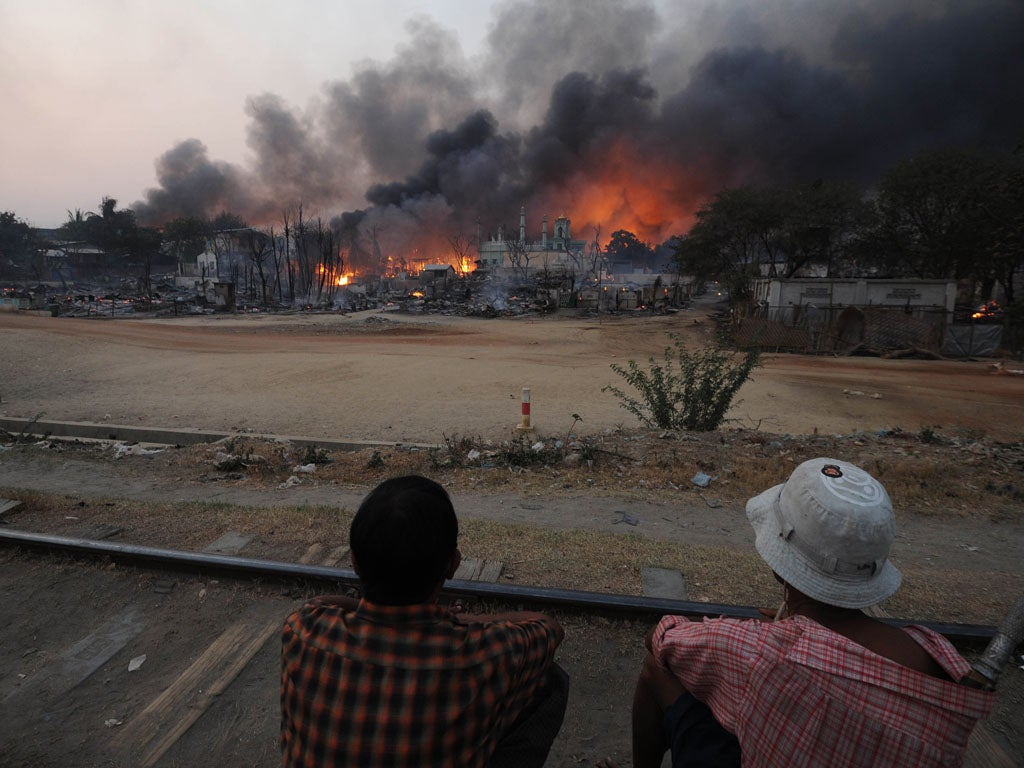Burma in 2013 reminds me of Yugoslavia in 1991
Nobody thought civil war could break out then - and the same view holds strong in Burma now. But violence this week may not be the end of it


Burma’s biggest city is spooked this week: many in Rangoon, a hot, sprawling, messy, splendid melting-pot of a city, fear that the contagion of communal violence which killed dozens in the central Burmese town of Meiktila last weekend is heading their way.
The massacre prompted headlines around the world, and condemnation by the US and British governments and others. Less noticed is that, while the Burmese army eventually stamped out the problem there, it has already popped up in three other towns closer to Rangoon, with mosques reportedly bulldozed to the ground in what appeared well-planned assaults. The mayhem seems to be heading our way, hopping towards the nation’s biggest and most important city via the hills around Pegu, the traditional holdout of bandits and insurgents.
Downtown Rangoon is as multi-cultural and multi-ethnic as you would expect of a post-colonial port city, with Hindus, Muslims and Christians from the Indian sub-continent sharing the tight-packed streets with Burmese Buddhists and Chinese. But the fear – directed specifically at Muslims by members of the majority community – is palpable. Rumours of imminent attacks have prompted many Muslim shopkeepers to pull down their shutters.
A top young media executive here pooh-poohed the idea that Rangoon could go the way of Meiktila. We’re too inter-mixed here, he assured me, we know how to get along, we’ve been in each other’s laps for generations. I told him when I was in Sarajevo in late 1991, people told me exactly the same thing. Six months later it was engulfed by civil war.
The situations are not wildly different. Like Yugoslavia then, Burma is in a moment of violent flux, and the elite that has exercised hegemonic control – Milosevic and his Communist Serbs there, the Burman-dominated armed forces here – risks losing it all in the convulsions of change. So they play dirty, working on the nastiest fears and instincts of their own people, inflaming hatred of communities traditionally considered the Other – Muslims in both cases.
One reason to hope for a better outcome in Burma is that President Thein Sein, though a former general, gives every indication of having a calm, wise head on his shoulders: most of the positive things that have happened here in the past two years are traceable to him. It’s been a remarkable and totally unexpected performance. There is every likelihood that his party will be supplanted by the National League for Democracy in the general elections of 2015, but the idea that, having pushed through so many important reforms, he would now conspire to bring the roof down, doesn’t make any sense.
Other generals, some very powerful not long ago, are another matter – and the subject of noisy rumours. But another factor which makes a violent implosion unlikely, is that Yugoslavia in the early 1990s was a basket case. Burma, by contrast, is clearly on the cusp of an economic boom. Many powerful people expect to get extremely rich here in the next few years. These former junta cronies have no wish to see their plans go up in smoke.
But the fact that Burma, having opened up so significantly in the past two years, is now witnessing such shocking communal violence is a reminder that nation building is a delicate task, and success depends a lot on how clever and lucky you are at breaking with old habits. Communal tensions seethed behind the façade of Tito’s Yugoslavia, masked by communist rhetoric. The Burmese army played the communal card over and over again to distract the people from their appalling standards of governance, driving home their vision of a state permanently dominated by Burmans and Buddhists.
However good your intentions, any Buddhist will tell you that you cannot dodge your karma. All actions have consequences. Neither democracy nor prosperity wields a magic wand, and bad rulers throw very long shadows.
North Korea’s nuclear threat
It is strange to see Kim Jong-un’s threats to fire nuclear-armed missiles at the US cause barely a stir. Hardly out of short trousers, I remember listening wide-eyed with alarm to news of the Cuban missile crisis. While nuclear weapons are more widely distributed than ever, the acute fear they generated back then seems to have gone away. I’m not sure this is a good thing.
And although North Korea is a pathetic little state, its links to the Cold War compulsions of nuclear threat and counter-threat run deep. It was born in the shadow of Hiroshima. The Americans itched to use the bomb to end the Korean war – creating Kim Il-Sung’s hunger to possess it himself. And in a way he was right – without the bomb and the blackmail it enables, the Kims would already have gone the way of Ceausescu.
Kim Jong-un’s threats must be taken seriously: in his folly, he might go so far as to push the button. Someone needs to get to him soon. As both his wife and the wife of China’s President Xi are famous singers, I wonder if some backstairs songbird diplomacy might be the place to start?

Join our commenting forum
Join thought-provoking conversations, follow other Independent readers and see their replies